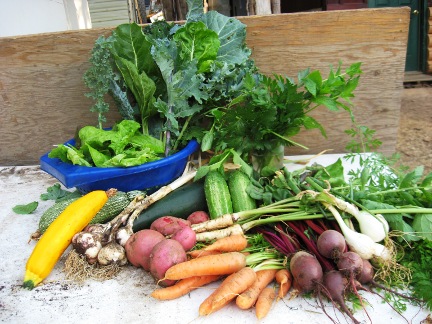Garden Notes for JulyJuly 15: Summer officially arrived a few weeks ago, and the garden plants are doing their part to keep pace with the calendar. The abundance of spring salad greens have begun to fade with the heat, while the first of the season's summer squash and string beans are making their way to the kitchen. The saying goes that corn should be knee high by the 4th of July, and the Oaxacan corn seems to have taken this suggestion to heart this year, and already stands above waist height. The pole beans are graciously climbing up the corn stalks, and the third and youngest sister, the winter squash, is beginning to stretch out in the shade of the corn.
There were several volunteer potato plants that grew up amongst the peppers, onions and cabbage in the lower terrace, the forgotten remnants of last year's harvest. I decided to let them grow and now that the flowers have finished blooming, I harvested about 30 pounds of "free" summer potatoes that required no planting or tending. So a little hands-off, zen gardening allowed us to increase our potato yield without reducing the vigor of the surrounding plants too much and of course to enjoy some early season potatoes. We'll keep the main crop of potatoes in the ground until the plants die back completely signaling the end of tuber growth.
We lost two beds of kale in the herb garden to the battle with the squirrels, but thankfully the kale, chard and collards in the main garden are still going strong. We are continuing to freeze the excess greens for the winter and already the freezer is getting quite full.
The root veggies--carrots, beets, onions, leeks, turnips, parsnips--are all developing nicely. Planting the carrots underneath the mulch surrounding the tomatoes did not work out so well, but planting carrots with radishes has worked very well, and the carrots, which are a particularly weed prone crop, have been relatively weed free.
I am trying to save as much seed as I can, which adds another level of complexity to rotating and maximizing the use of bed space, as plants are in the ground for longer. But if I can be patient enough, it looks like we'll be able to harvest a nice crop of carrot (from last year), radish, arugula, beet, spinach, chard, dill and coriander seeds fairly soon.
The tomatoes are coming along quite nicely. The plants have lots of flowers and developing fruits. The peppers, however, seem to be developing more slowly, in part because they were shaded by the volunteer potato plants.
I cannot sing the praises enough of heavy mulching. It works wonders--reducing the need to weed to a minimal effort and retaining soil moisture exceptionally well, which in our hot dry summers is critical for plant survival and efficient water use. The mulch has to be thick enough so that no light reaches the soil or else there will be weeds; and the only draw back is sometimes there is seed in the hay, but I have just been harvesting the little bits of grass that have grow up to feed to the bunnies. The heavy mulch works best for plants that are being transplanted--tomatoes, squash, peppers, onions, kale, chard--and works well for plants direct seeded in rows such as peas and beans, but I am still working on developing the best method for mulching broadcasted, direct seeded plants.
One of the most relaxing places to sit come evening, when the light is low and the heat of the day has subsided, is right in the middle of the lavender patch. The flowers are almost at their peak oil production (which means it is almost time to harvest) and so the smell of lavender infuses the air. The bees are busy at work gathering food and pollinating the flowers, making me feel guilty for enjoying the evening in the middle of the lavender patch.
July 29: Lindsay: Harvesting Garlic and Cucumbers The heat of summer has descended, with temperatures frequently reaching into the triple digits. As everyone tries to stay cool, the plants too are trying to make it through the dry heat. As the summer continues, water becomes critical up here on the plateau. This is when the garden is really tested--whether the plants are sufficiently mulched, whether the soil has enough organic matter to retain every possible drop of moisture.
The garlic and potatoes, which used the spring moisture to do most of their growing are now nearing completion. The garlic has died back fully and so yesterday afternoon I harvested it; many, many cloves will be saved for planting this fall (the biggest and the best), while the rest will be for the kitchen. Just in time too, because garlic's most beloved companion, basil, is growing fast and abundantly. The onions and beets which also took advantage of the spring moisture, are bulbing up nicely.
Remarkably the kale and chard in the main garden is still producing, even through this heat, and the corn is now donned with tassels. The honey bees are happily busy pollinating the flowers on the squash and tomatoes.
The cucumbers and summer squash planted in duck-ponics are doing very well. Both crops are water intensive so they are difficult to grow here with the water scarcity come July and August. But the closed loop water cycling created by duck-ponics, with the added nutrients from the ducks, makes for a very water-efficient system, quite well adapted to our environment.
[Walt: the mint grown in the duckponics system is quite flavorful. It's a treat to pick a leaf to chew on as one passes by the system.] The pickling cucumbers are producing abundantly so that soon we can, along with some dill from the herb garden, make a good-sized batch of pickles.
|












